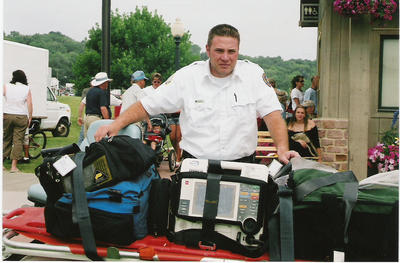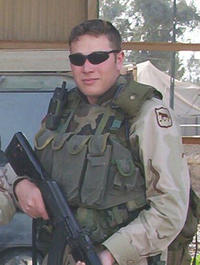Nate Christopherson: Leadership, Commitment, Service
all this week, national nurses week, we’ll be showcasing just a few of the many amazing students and faculty that make yale school of nursing a singular place for scholarship and leadership. their stories are featured in the latest edition of yale nursing matters magazine which will be posted online this friday.
When Nate Christopherson was a boy growing up in Sioux Falls, South Dakota, he spent more than a few Saturdays at his father’s EMT Basic certification class.
As the assessment mannequin.
His dad, Reid, then working with a crash investigation team for the U.S. Air Force, was taking EMT classes as part of a larger portfolio of disaster preparedness training and Christopherson was an eager and willing participant. “I remember thinking that his classmates were just so cool,” he says. “I don’t know why, I just thought they were the coolest people ever.” His father’s class would practice everything from the mundane, like splinting “broken” bones to the more urgent, like responding to mass casualty events where young Nate would play a victim.
Those early Saturday mornings left an impression. By the age of 18, Christopherson had become an EMT Basic himself and followed that accomplishment with a year of basic training with the South Dakota Air National Guard.

“I really honestly didn’t know what I wanted to do with my life at that point. My parents forced me to go to college, so I went to school,” Christopherson says.
On orientation day, he followed a friend into the pre-nursing group and it stuck. While taking nursing courses during the day, he was also getting his paramedic certification at night and, now a member of the South Dakota Army National Guard, he was also fulfilling another call to service: Operation Iraqi Freedom.
For months, Christopherson missed nursing classes in order to help prepare activated units for deployment to Iraq. Then, the medical unit that fell under his battalion received word that not only had it been called up to deploy but it was also short on medics. So, when Christopherson arrived to help with the unit’s deployment activation, “They handed me all my equipment and they said, ‘Oh, by the way, you’re going with them.’”
Nate Christopherson, a paramedic, on his way to becoming a nurse was now also a combat medic on his way to Baghdad.
 Once on the ground, when he wasn’t working in a medical capacity, he worked as a gunner doing convoy security and helping out in the motor pool. Christopherson sees his commitment to service both military and civilian as just part of who he is. “Doing trauma care, even with the intense chaos all around, it was easy for me to be able to focus on what needed to be done at that moment to save someone’s life.”
Once on the ground, when he wasn’t working in a medical capacity, he worked as a gunner doing convoy security and helping out in the motor pool. Christopherson sees his commitment to service both military and civilian as just part of who he is. “Doing trauma care, even with the intense chaos all around, it was easy for me to be able to focus on what needed to be done at that moment to save someone’s life.”
It makes some sense then that after his return from Iraq and after finishing his nursing degree, he ended up in an emergency room – the first new graduate nurse ever hired by Sanford USD Medical Center.
From there, he rose up the ranks and, perhaps no coincidence, it was his military training that influenced his direction and determination.
“I didn’t leave bedside care because I didn’t enjoy it. I left bedside care because of the frustrations that I had with the administration. So instead of being the person that just sits there and complains about it, I adopted the attitude, and a lot of this comes from my time in the military, don’t just gripe about it. Do something about it. So I did.”
He became one of the youngest charge nurses in the emergency department and followed that with a combined MBA/MSN degree, as well as multiple certifications, before becoming the medical center’s Pediatric Trauma Program Manager.
He is now the Assistant Vice President of Northwell Health Trauma Institute, overseeing eight trauma centers in the New York City region. Most people would stop there.
But influenced in part by the “high caliber” (as he describes it) of medical professionals he encountered in New York, he decided to pursue his Doctor of Nursing Practice (DNP) at Yale School of Nursing.
While Christopherson is already incorporating evidence-based practice in his centers and in the surrounding community, he says the DNP curriculum enhances what he does day-to-day, making him better and building upon his foundation of commitment, leadership and service.
The credit for the bulk of his success both now and in the future, however, he gives to his parents, Reid and Ruth, and to his time serving his country, “The military really shaped who I am and what I’ve done in my life and who I’ve become.”
